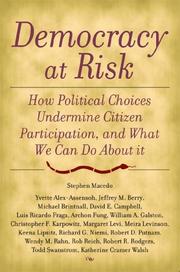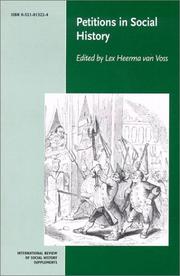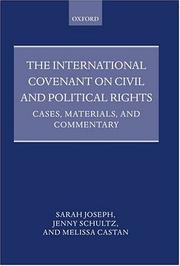| Listing 1 - 10 of 344 | << page >> |
Sort by
|
Book
ISBN: 9061840929 Year: 1981 Publisher: Amersfoort De Horstink
Abstract | Keywords | Export | Availability | Bookmark
 Loading...
Loading...Choose an application
- Reference Manager
- EndNote
- RefWorks (Direct export to RefWorks)
Private law --- Didactics of social education --- Social problems --- Government, Resistance to. --- Political participation --- Political rights --- Violence --- Netherlands --- Politics and government
Book
ISBN: 9780198705789 0198705786 Year: 2014 Publisher: Oxford: Oxford university press,
Abstract | Keywords | Export | Availability | Bookmark
 Loading...
Loading...Choose an application
- Reference Manager
- EndNote
- RefWorks (Direct export to RefWorks)
The denial of voting rights to certain types of persons continues to be a moral problem of practical significance. The disenfranchisement of persons with mental impairments, minors, noncitizen residents, nonresident citizens, and criminal offenders is a matter of controversy in many countries. How should we think morally about electoral exclusions? What should we conclude about these particular cases? This book proposes a set of principles, called the Critical Suffrage Doctrine, that defies conventional beliefs on the legitimate denial of the franchise. According to the Critical Suffrage Doctrine, in some realistic circumstances it is morally acceptable to adopt an alternative to universal suffrage that would exclude the vast majority of sane adults for being largely uninformed. Thus, contrary to what most people believe, current controversies on the franchise are not about exploring the limits of a basic moral right. Regarding such controversies, the Critical Suffrage Doctrine establishes that, in polities with universal suffrage, the blanket disenfranchisement of minors and the mentally impaired cannot be justified; that noncitizen residents should be allowed to vote; that excluding nonresident citizens is permissible; and that criminal offenders should not be disenfranchised-although facilitating voting from prison is not required in all contexts. Political theorists have rarely submitted the franchise to serious scrutiny. Hence this study makes a contribution to a largely neglected and important subject.
Suffrage --- Political rights, Loss of --- Voting --- Droits politiques --- Vote --- Moral and ethical aspects --- Perte --- Aspect moral --- Suffrage. --- Political rights, Loss of. --- #SBIB:324H42 --- Polls --- Elections --- Politics, Practical --- Social choice --- Loss of political rights --- Punishment --- Citizenship, Loss of --- Infamy (Law) --- Franchise --- Right to vote --- Voting rights --- Political rights --- Plebiscite --- Representative government and representation --- Moral and ethical aspects. --- Politieke structuren: verkiezingen --- Law and legislation --- Politieke systemen --- Publiek recht. Staatsrecht --- Political systems --- Public law. Constitutional law --- Balloting
Book
ISBN: 9781782258155 9781782258162 1782258159 Year: 2016 Volume: 61 Publisher: Oxford: Hart,
Abstract | Keywords | Export | Availability | Bookmark
 Loading...
Loading...Choose an application
- Reference Manager
- EndNote
- RefWorks (Direct export to RefWorks)
Human rights --- European law --- Citizenship --- Equality before the law --- Political rights --- Likhet inför lagen --- Politiska rättigheter --- Medborgarskap --- Citizenship. --- EU-länderna --- Likhet inför lagen. --- Politiska rättigheter. --- Medborgarskap. --- Equality before the law. --- Political rights. --- EU-länderna. --- Citizenship - European Union countries --- Equality before the law - European Union countries --- Political rights - European Union countries
Book
ISBN: 9780199389230 0199389233 019938925X 0199389241 0190942622 Year: 2019 Publisher: New York, NY : Oxford University Press,
Abstract | Keywords | Export | Availability | Bookmark
 Loading...
Loading...Choose an application
- Reference Manager
- EndNote
- RefWorks (Direct export to RefWorks)
"People convicted of crimes are subject to a criminal sentence, but they also face a host of other restrictive legal measures: Some are denied access to jobs, housing, welfare, the vote, or other goods. Some may be deported, may be subjected to continued detention, or may have their criminal records made publicly accessible. These measures are often more burdensome than the formal sentence itself. In Beyond Punishment?, Zachary Hoskins offers a philosophical examination of these burdensome legal measures, called collateral legal consequences. Drawing on resources in moral, legal, and political philosophy, Hoskins analyzes the various kinds of collateral consequences imposed in different legal systems and the important moral challenges they raise. Can collateral legal consequences ever be justified as forms of criminal punishment or as civil measures? Hoskins contends that, considered as forms of punishment, such restrictions should be constrained by considerations of proportionality and offender reform. He also argues that they may in a limited range of cases be permissible as risk-reductive civil measures. Whether considered as criminal punishment or civil measures, however, collateral legal consequences are justifiable in a far narrower range of cases than we find in current legal practice. Considering just how pervasive collateral legal consequences have become and their dramatic effects on offenders' lives, Beyond Punishment? sheds valuable light on whether these restrictive measures are ever morally justified"--Publisher's website.
Punishment --- Ex-convicts --- Political rights, Loss of --- Philosophy --- Legal status, laws, etc --- Loss of political rights --- Suffrage --- Citizenship, Loss of --- Infamy (Law) --- Ex-cons --- Ex-offenders --- Ex-prisoners --- Prisoners --- Recidivists --- Law and legislation --- Political rights, Loss of. --- Legal status, laws, etc. --- Philosophy. --- Political philosophy. Social philosophy --- Legal theory and methods. Philosophy of law --- Peines --- Ex-détenus --- Incapacités résultant des condamnations pénales --- Philosophie. --- Statut juridique. --- Formerly incarcerated persons --- Ex-détenus --- Incapacités résultant des condamnations pénales

ISBN: 0815754043 0815754051 9780815754046 9780815754053 Year: 2005 Publisher: Washington, D.C. Brookings Institution Press
Abstract | Keywords | Export | Availability | Bookmark
 Loading...
Loading...Choose an application
- Reference Manager
- EndNote
- RefWorks (Direct export to RefWorks)
""Documents how recent trends in civic engagement have been shaped by political institutions and public policies and recommends ways to increase the amount, quality, and distribution of civic engagement, focusing on elections, the metropolis, and the nonprofit sector and philanthropy""--Provided by publisher.
Political systems --- United States --- Political participation - United States. --- Political participation --- Citizenship --- Government - U.S. --- Law, Politics & Government --- Political Rights - U.S. --- United States of America

ISBN: 0521013224 0511550162 9780521013222 9780511550164 Year: 2002 Volume: 9 Publisher: Cambridge : Cambridge University Press,
Abstract | Keywords | Export | Availability | Bookmark
 Loading...
Loading...Choose an application
- Reference Manager
- EndNote
- RefWorks (Direct export to RefWorks)
This book looks at petitions over the last five centuries to reconstruct the lives and opinions of 'humble' petitioners. Since Pharaonic times, governments have allowed their subjects to voice opinions in the form of petitions, which have demanded a favour or the redressment of an injustice. To be effective, a petition had to mention the request, usually a motivation and always the name or names of the petitioners. As a result, grievances of ordinary people which were not written down anywhere else are now stored safely in the archives of the authorities to which the petitions were addressed. The petitions considered in this book, which come from all over the globe, offer rich and valuable sources for social historians.
Petition, Right of --- Social history. --- History. --- History --- Social history --- Petitory actions --- Arts and Humanities --- Petition, Right of - History --- Petition, Right of. --- Right of petition --- Political rights
Book
ISBN: 9781107070493 9781107707436 9781107682504 1107682509 Year: 2017 Publisher: Cambridge: Cambridge university press,
Abstract | Keywords | Export | Availability | Bookmark
 Loading...
Loading...Choose an application
- Reference Manager
- EndNote
- RefWorks (Direct export to RefWorks)
"In this book, Mark Dawson looks at the mechanisms through which EU fundamental rights are protected and enforced, closely examining the inter-relation between the EU's pertinent legal and political bodies"-- "In spite of a continued increase in the substantive scope and reach of EU fundamental rights, little attention has been paid to their practical enforcement. In this book, Mark Dawson looks at the mechanisms through which EU fundamental rights are protected and enforced, closely examining the interrelation between the EU's pertinent legal and political bodies. He argues that in order to understand EU fundamental rights we must also understand the institutional, political and normative constraints that shape the EU's policies. The book examines the performance of different EU institutions in relation to rights and studies two important policy fields - social rights and rule of law protection - in depth"--
Civil rights --- Social rights --- Law --- Human rights --- Basic needs --- European Union countries --- European Union --- Political rights --- Socio-economic rights --- Socioeconomic rights --- Law and legislation
Multi
ISBN: 1848137869 1780345151 1848133537 9781848133532 9781848133518 1848133510 9781848133525 1848133529 1350222836 Year: 2009 Publisher: London, England : [London, England] : Zed Books, Bloomsbury Publishing,
Abstract | Keywords | Export | Availability | Bookmark
 Loading...
Loading...Choose an application
- Reference Manager
- EndNote
- RefWorks (Direct export to RefWorks)
This book brings together new material from across Africa of the most egregious examples of citizenship discrimination, and makes the case for urgent reform of the law.
Citizenship --- Birthright citizenship --- Citizenship (International law) --- National citizenship --- Nationality (Citizenship) --- Political science --- Public law --- Allegiance --- Civics --- Domicile --- Political rights --- Law and legislation --- Political sociology --- Africa --- Civil rights & citizenship

ISBN: 0198267746 9780198267744 Year: 2000 Publisher: Oxford: Oxford university press,
Abstract | Keywords | Export | Availability | Bookmark
 Loading...
Loading...Choose an application
- Reference Manager
- EndNote
- RefWorks (Direct export to RefWorks)
Human rights --- Civil rights --- Political rights --- Droits de l'homme --- Droits politiques --- Droits de l'homme (Droit international) --- Civil rights. --- Political rights. --- Human rights. --- Civic rights --- Citizenship --- Basic rights --- Civil rights (International law) --- Rights, Human --- Rights of man --- Human security --- Transitional justice --- Truth commissions --- Civil liberties --- Constitutional rights --- Fundamental rights --- Rights, Civil --- Constitutional law --- Political persecution --- Law and legislation
Book
ISBN: 9780192802538 0192802534 9780191539145 0191539147 1282135546 9781282135543 9780191775604 0191775606 9780191577680 0191577685 9786612135545 6612135549 Year: 2008 Volume: 192 Publisher: Oxford ; New York : Oxford University Press,
Abstract | Keywords | Export | Availability | Bookmark
 Loading...
Loading...Choose an application
- Reference Manager
- EndNote
- RefWorks (Direct export to RefWorks)
Interest in citizenship has never been higher. But what does it mean to be a citizen in a modern, complex community? Richard Bellamy approaches the subject of citizenship from a political perspective and, in clear and accessible language, addresses the complexities behind this highly topical issue.
Political sociology --- Citizenship --- Citizenship. --- Citoyenneté. --- POLITICAL SCIENCE --- Political Freedom & Security --- Civil Rights. --- Human Rights. --- borgerlige rettigheder --- medborgerskab --- statsborgeskab --- medborgerskap --- statsborgerskap --- rettigheter --- politikk --- Political rights. --- Civic rights --- Political rights --- Civil rights --- Birthright citizenship --- Citizenship (International law) --- National citizenship --- Nationality (Citizenship) --- Political science --- Public law --- Allegiance --- Civics --- Domicile --- Law and legislation
| Listing 1 - 10 of 344 | << page >> |
Sort by
|

 Search
Search Feedback
Feedback About UniCat
About UniCat  Help
Help News
News